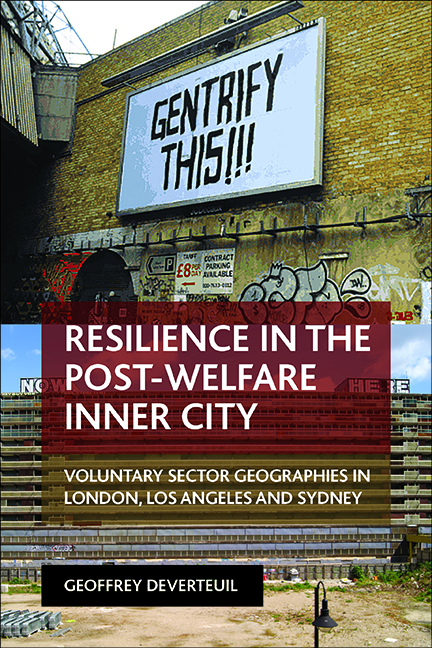 Resilience in the Post-Welfare Inner City
Resilience in the Post-Welfare Inner City Book contents
- Frontmatter
- Dedication
- Contents
- List of tables and figures
- About the author
- Acknowledgements
- Preface
- Part One Introducing resilience in the post-welfare inner city: conceptual and methodological considerations
- Part Two Case studies: spatial and social resilience in London, Los Angeles and Sydney
- Part Three Conclusions, critical resilience, commons and austerity
- References
- Index
two - Resilience and residualism
Published online by Cambridge University Press: 10 March 2022
- Frontmatter
- Dedication
- Contents
- List of tables and figures
- About the author
- Acknowledgements
- Preface
- Part One Introducing resilience in the post-welfare inner city: conceptual and methodological considerations
- Part Two Case studies: spatial and social resilience in London, Los Angeles and Sydney
- Part Three Conclusions, critical resilience, commons and austerity
- References
- Index
Summary
In this chapter I develop a parsimonious concept of social and spatial resilience that is directly applicable to residual arrangements, which I take to be service hubs, while also opening up some critical intent for the term. It is this careful and singular focus on resilience that builds upon, but also sets my work apart from, others who have deployed resilience from a critical (yet more peripheral) perspective (for example, Katz, 2004; Cloke et al, 2010; May & Cloke, 2014). Before proceeding to working definitions of social and spatial resilience, I should make clear the obvious: that resilience has become an academic and political buzzword, and its popularity has soared in the past ten years, moving from the natural sciences to the social sciences with apparent (yet worrying) ease (Brown, 2014). Analysis of the Web of Science shows a dramatic rise of the use of resilience since 2000 (Brown, 2014). A search with Google Scholar revealed more than 991,000 results (as of December 2013), with more than 60,000 hits in 2013 alone. Raco and Street (2012) argued that resilience is overtaking ‘sustainability’ as the mot du jour, more suitable to the short-term ability to cope with what could be very long-term trends that are impossible to fully predict, comprehend or easily change. Resilience has also begun to leach in to the popular imagination with atheoretical coffee table and pop psychology books such as Resilience: Why things bounce back (Zolli & Healy, 2013) and Resilience: How to cope when everything around you keeps changing (Webb, 2013), respectively, to say nothing about the rash of academic journals: Resilience: A Journal of the Environmental Humanities, Ecology and Society; Resilience: International Policies, Practices and Discourses; Resilience: Interdisciplinary Perspectives on Science and Humanitarianism; and Society and Natural Resources. Perhaps because of its haphazard proliferation, maddening suppleness, conceptual patchiness and sprawling approach, resilience has attracted suspicion that it lacks operational clarity and unity, problematically transfers ecological concepts into societal contexts while under-theorising the social dimensions, underplays endogenous dynamics, and presents considerable methodological hurdles, thus edging close to ‘misused concept’ and ‘chaotic concept’ territory (Walker et al, 2006; Martin, 2012; Raco & Street, 2012; Ward, 2012; Brown, 2014).
- Type
- Chapter
- Information
- Resilience in the Post-Welfare Inner CityVoluntary Sector Geographies in London, Los Angeles and Sydney, pp. 23 - 40Publisher: Bristol University PressPrint publication year: 2015


